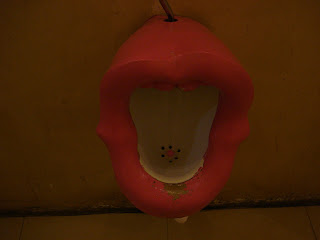On Friday morning I left with a few others to go on a Three Gorges Yangtze River cruise. The bus ride to get to the boat was filled with old, loud,
Chongqing people. A sign of things to come. The foreigners’ ears were ringing as the others screamed up and down the bus at each other, over the cacophony of a James Bond movie that had audio playing both Chinese and English simultaneously. After Bond, there was a Chinese comedy DVD, which I'm sorry to say, had a strange Jerry Lewis feel to it.
The first stop on the bus was to see a waterfall. Maybe Canada and the U.S. should take a page from China’s book and start charging people to look at Niagara Falls? In China no scenic spot comes without a price tag. For some unknown reason, the bus also stopped at some warehouse/store named Carpenter Tan, where the main products on sale were expensive wooden combs. Can anyone explain how a comb could be worth a few thousand renminbi? Once we finally got onto the boat there were a couple of hours before stopping at another tourist trap. This one was the shrine of Zhang Fei, or something like that. More pictures were taken.
Our cabin on the boat was tiny, but at least there was a western style toilet seat. Too bad hot water was lacking in the shower. We would become quite acquainted with our cabin as the trip grew longer. What was supposed to be a 3 day trip turned into 4.
From Saturday morning to Sunday evening the boat was docked in one place as a thick fog had descended over the Yangtze. By Saturday night there was a mutiny brewing on the ship, as dozens of angry passengers berated the couple of crew members standing behind the main service desk. I have no way of knowing what was being said, but it must have mostly been about the passengers not believing that it was too dangerous to keep going in the fog. After all, we started in fog, ended in fog, and had fog, fog, fog and more fog in between.
We took buses through the hills to get to the 3 Gorges Damn. It seems to me to be quite the prototypical China thing to do to make a huge pile of concrete into a tourist attraction. No mention anywhere of the millions of homes lost because of the building of the damn. And definitely no mention of the actual and potential environmental impact of the project, but there was a lovely little garden for the tourists to walk through as they snapped their pictures.




















